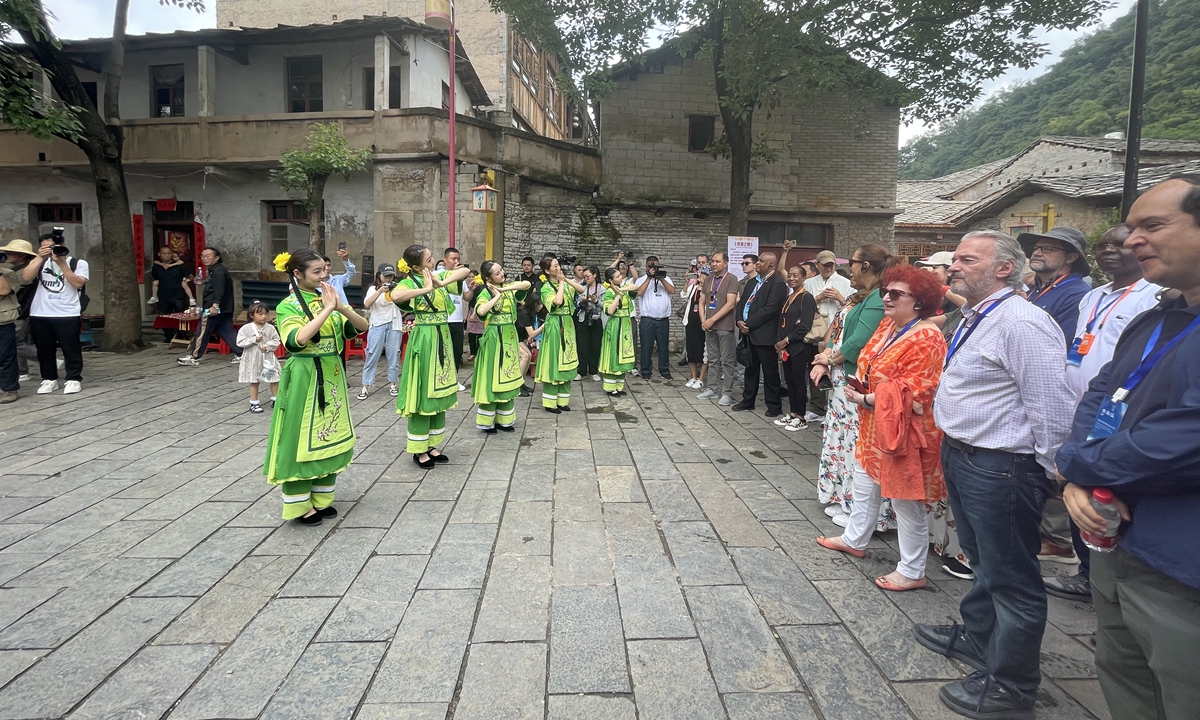ARTS / CULTURE & LEISURE
Traveling with diplomats
Green, open and well-preserved Guizhou worth visiting: ambassadors

Visiting envoys enjoy a cultural dance performance at Denon Tunpu, a famous historical and cultural township in Anshun, Guizhou Province on June 4. Photo: Liu Caiyu/GT
On my flight from crowded Beijing to Guizhou, a province located in Southwest China, I watched out of the window and my eyes fell on a vast green landscape that had me thinking I was reaching a sort of natural wonderland.
Diplomats from 19 countries and the Shanghai Cooperation Organisation who are stationed in China paid a visit to the province this week and they too were struck by the natural beauty of the place.
During my trip with the diplomats, I heard a variety of adjectives referring to the area, with "amazing," "splendid," "stunning," and "fantastic" being among the most used by the diplomats to describe the region.
While I talked to Manasa R. Tagicakibau, Fiji's ambassador to China, we were standing right on a small patch of ground surrounded with mountains covered by trees by the Wujiang River, the mother river of Guizhou. He said he was fascinated by the landscape of Guizhou from the first day of his visit.
Chirping birds
Just when Ambassador of Mauritius to China Alain Wong Yen Cheong finished taking selfies with his wife with the marvelous mountains as a backdrop, he spotted a bird resting on a tree. "Do you see it? That's a bird called colibri (hummingbird)." It's a very good sign that these birds that have disappeared from many places in the world are returning to Guizhou, he said.
Indeed wherever we went on our trip, birds were always chirping. Near the Shili River of Guiyang, capital of Guizhou, locals can be found fishing along the peaceful riverside, dancing with friends, or practicing the lilting melodies of the lusheng, a traditional Chinese wind instrument, while birds provide a background melody.

Diplomats pose for a picture with their Chinese fans at Confucius Academy in Guiyang on June 6, 2023. Photo: Liu Caiyu/GT
While we were on a shuttle bus touring the park along the Shili River, Martha Mavrommati, the ambassador of Cyprus to China, couldn't help but start moving her body to the sound of nearby music.
It's this reverence for green resources that brings such happiness to the people of Guizhou.
Alongside the mountains and valleys, a number of impressive bridges connect villages, bringing in new technology, new infrastructure and making life easier for the locals. When the visiting ambassadors and I saw the Baling River Bridge lying at an impressive 370 meters over a valley, situated near the Huangguoshu Waterfall, we truly understood what bridges meant for Guizhou, its economy and its people.
Agricultural products and local specialties can be quickly delivered to other cities, helping local markets expand outreach and online business through the use of these gargantuan infrastructures.
Guizhou possesses nearly half of the 100 tallest bridges in the world and the region is known as "the museum of world bridges."
Guizhou shares a lot of similarities with some of the mountainous regions of Fiji, but there is a lot to be done in Fiji in terms of accessibility and infrastructure is an area in which Fiji can learn from China, Tagicakibau said.

Diplomats visit the Baling River Bridge situated near the Huangguoshu Waterfall on June 4, 2023. Photo: Liu Caiyu/GT
Vibrant city
Involved in a process of rapid urbanization, Guiyang maintains a delicate balance between modernization and the preservation of its past. Its city center, thanks to the province's commitment to environmental conservation, retains original architecture and neighborhoods that evoke a strong sense of history.
Wandering through Guiyang's streets and terraces, one can't help but notice the lively ambiance created by the mix of high and low roads, and the unique layout of the buildings.
Evenings in Guiyang are a time for locals to unwind. At around 10 pm, some gather at street corners, chatting with neighbors and venting about their day's work while shopping at roadside fruit stands. A bunch of friends and off-duty middle-aged workers can be found huddling around barbecue stands, savoring skewers and sipping beer.
Much like London or New York City, Guiyang's taxis frequently cater to the nightlife crowd, waiting outside nightclubs and bars to transport revelers home, after a night of merriment. Some ambassadors who went for a walk at night told me that the city has so much to offer at night and they felt very positive vibes from locals and tourists alike.
The ambassador of Mauritius, who visited Guizhou in 2018, remarked that local people seemed happier than during his last visit. He remembered that at the time some villages in the province had no access to toilets and clean water, but now it is evident that the country's poverty alleviation schemes have addressed these problems. Villagers can now enjoy the same conveniences as those living in urban cities.
From airport pickups to hotel check-ins, village tours, and restaurants, the foreign guests are always surrounded by dance and music, singing and tea. In such an atmosphere even the most serious-looking ambassadors looked suddenly delighted, accepting the tea with both hands and taking a sip.
Among the 20 diplomats, I spoke to quite a number of them and they all expressed the wish to come back again one day, either with their families or with delegations from their countries to explore more cooperation potential with Guizhou, a place they consider green, open and well-preserved.




